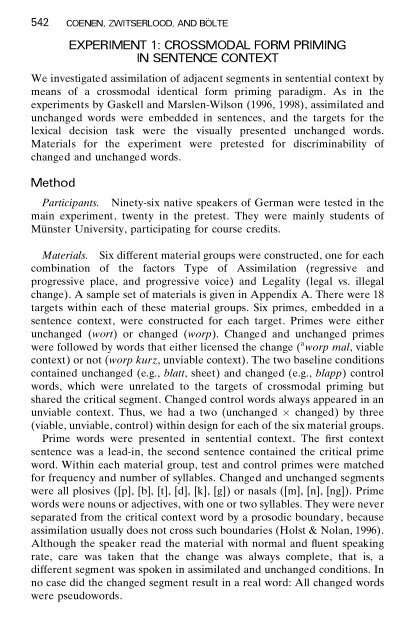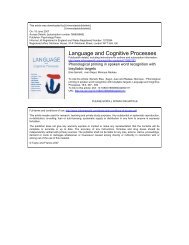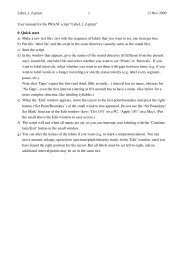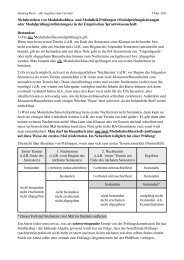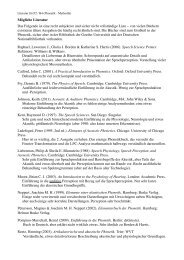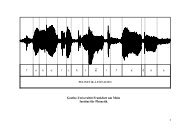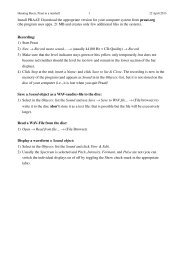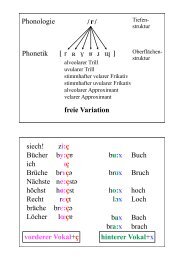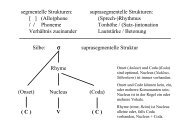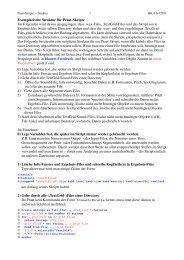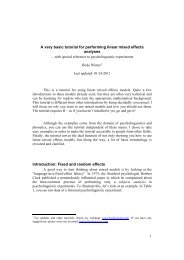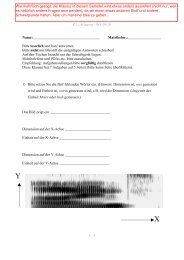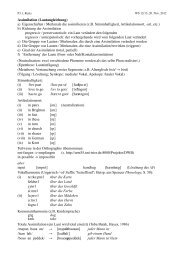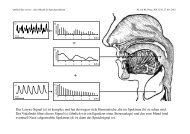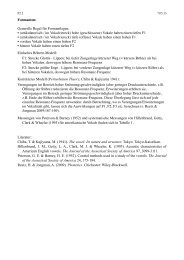Variation and assimilation in German - Institut für Phonetik
Variation and assimilation in German - Institut für Phonetik
Variation and assimilation in German - Institut für Phonetik
Create successful ePaper yourself
Turn your PDF publications into a flip-book with our unique Google optimized e-Paper software.
542 COENEN, ZWITSERLOOD, AND BOÈLTE<br />
EXPERIMENT 1: CROSSMODAL FORM PRIMING<br />
IN SENTENCE CONTEXT<br />
We <strong>in</strong>vestigated <strong>assimilation</strong> of adjacent segments <strong>in</strong> sentential context by<br />
means of a crossmodal identical form prim<strong>in</strong>g paradigm. As <strong>in</strong> the<br />
experiments by Gaskell <strong>and</strong> Marslen-Wilson (1996, 1998), assimilated <strong>and</strong><br />
unchanged words were embedded <strong>in</strong> sentences, <strong>and</strong> the targets for the<br />
lexical decision task were the visually presented unchanged words.<br />
Materials for the experiment were pretested for discrim<strong>in</strong>ability of<br />
changed <strong>and</strong> unchanged words.<br />
Method<br />
Participants. N<strong>in</strong>ety-six native speakers of <strong>German</strong> were tested <strong>in</strong> the<br />
ma<strong>in</strong> experiment, twenty <strong>in</strong> the pretest. They were ma<strong>in</strong>ly students of<br />
Münster University, participat<strong>in</strong>g for course credits.<br />
Materials. Six different material groups were constructed, one for each<br />
comb<strong>in</strong>ation of the factors Type of Assimilation (regressive <strong>and</strong><br />
progressive place, <strong>and</strong> progressive voice) <strong>and</strong> Legality (legal vs. illegal<br />
change). A sample set of materials is given <strong>in</strong> Appendix A. There were 18<br />
targets with<strong>in</strong> each of these material groups. Six primes, embedded <strong>in</strong> a<br />
sentence context, were constructed for each target. Primes were either<br />
unchanged (wort) or changed (worp). Changed <strong>and</strong> unchanged primes<br />
were followed by words that either licensed the change ( a worp mal, viable<br />
context) or not (worp kurz, unviable context). The two basel<strong>in</strong>e conditions<br />
conta<strong>in</strong>ed unchanged (e.g., blatt, sheet) <strong>and</strong> changed (e.g., blapp) control<br />
words, which were unrelated to the targets of crossmodal prim<strong>in</strong>g but<br />
shared the critical segment. Changed control words always appeared <strong>in</strong> an<br />
unviable context. Thus, we had a two (unchanged £ changed) by three<br />
(viable, unviable, control) with<strong>in</strong> design for each of the six material groups.<br />
Prime words were presented <strong>in</strong> sentential context. The rst context<br />
sentence was a lead-<strong>in</strong>, the second sentence conta<strong>in</strong>ed the critical prime<br />
word. With<strong>in</strong> each material group, test <strong>and</strong> control primes were matched<br />
for frequency <strong>and</strong> number of syllables. Changed <strong>and</strong> unchanged segments<br />
were all plosives ([p], [b], [t], [d], [k], [g]) or nasals ([m], [n], [ng]). Prime<br />
words were nouns or adjectives, with one or two syllables. They were never<br />
separated from the critical context word by a prosodic boundary, because<br />
<strong>assimilation</strong> usually does not cross such boundaries (Holst & Nolan, 1996).<br />
Although the speaker read the material with normal <strong>and</strong> uent speak<strong>in</strong>g<br />
rate, care was taken that the change was always complete, that is, a<br />
different segment was spoken <strong>in</strong> assimilated <strong>and</strong> unchanged conditions. In<br />
no case did the changed segment result <strong>in</strong> a real word: All changed words<br />
were pseudowords.


